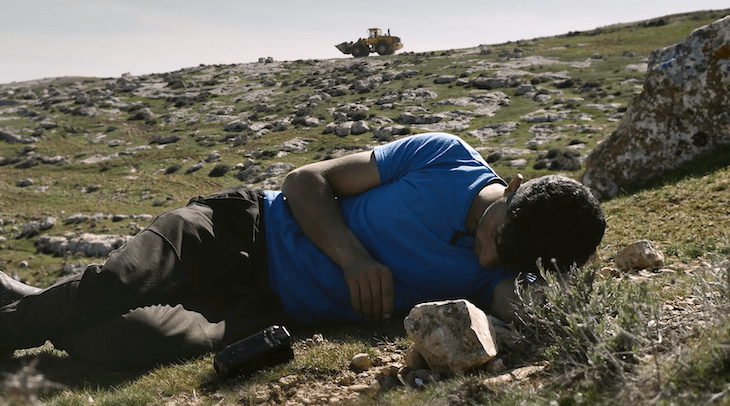The Oscars, an institution that claims to celebrate artistic excellence, this week played a leading role in a sophisticated and cynical propaganda campaign against Israel. The 2024 Academy Award for Best Documentary went to No Other Land, a film that, beneath the veneer of raw storytelling and supposed human rights advocacy, is little more than a masterclass in Palestinian distortion. It is not a documentary in the truest sense of the word but a carefully crafted piece of demagoguery –designed not to illuminate but to vilify, to cast Israel as the villain in a narrative that, in reality, it did not write.
The irony is staggering. Even as Israel fights to defend itself against the most barbaric assault in its history – the Hamas-led invasion of 7th October, in which Palestinian terrorists butchered civilians, raped women, and abducted hostages, some of whom are now being returned in coffins or in states of unimaginable trauma – Hollywood has seen fit to bestow its golden seal of approval on yet another attempt to delegitimise the Jewish state.
Directed by a Palestinian-Israeli collective, No Other Land follows Basel Adra, a young Palestinian activist documenting the Israeli military’s efforts to remove ‘ancient’ Palestinian villages in the West Bank region of Masafer Yatta. The film weaves a deeply emotive narrative of forced displacement and oppression, a desperate struggle against an unjust occupier. But, as with all effective propaganda, its power lies not in what is said, but in what is deliberately left unsaid.
Masafer Yatta lies in Area C, the portion of the West Bank under full Israeli control as established by the Oslo Accords. It was designated a military training zone in the 1980s, at which time it was uninhabited – a barren expanse used by the Israeli Air Force for live-fire exercises. The so-called Palestinian ‘villages’ whose destruction the film mourns did not exist then. Aerial photographs dating back as recently as 1945 – some submitted to Israel’s Supreme Court by the Palestinians themselves – show no signs of residential presence before the 1980s. Only in the 2000s do traces of habitation appear.
The Israeli military initially permitted seasonal use of the land, allowing Palestinian farmers and shepherds to graze livestock and cultivate crops during lulls in training exercises. But what began as an opportunistic encroachment soon evolved into a coordinated campaign of territorial expansion: one not merely tolerated but actively encouraged and funded by the Palestinian Authority and European governments. This was no organic community rooted in ancestral soil; it was a calculated political manoeuvre designed to create irreversible facts on the ground.
The Palestinian Authority has long pursued a policy of de facto annexation of Area C, channelling resources into illegal construction to reshape the geopolitical map without negotiation or compromise.
Since 2009, when the Palestinian prime minister declared the Oslo framework obsolete, the PA has engaged in unilateral expansion. Astonishingly, more than 60 per cent of Areas A and B – territory already under full Palestinian control – remains undeveloped and available for construction. Yet rather than build there, the PA encourages building in Area C, a strategy financed in part by European governments and NGOs eager to challenge Israeli sovereignty.
The legal battle over Masafer Yatta has been waged for decades. In 2000, a group of Palestinian residents petitioned Israel’s High Court of Justice to block the demolition of their unauthorised structures, securing a temporary injunction that suspended demolitions but also prohibited new construction. In the intervening years, the illegal building did not stop; it accelerated. By the time the court issued its 2022 ruling, it found that the appellants had systematically violated the injunction, expanding their settlements while simultaneously portraying themselves as victims. The court also determined that many of these supposed ‘villagers’ were, in fact, permanent residents of Yatta, returning to the area only for political and legal advantage.

Yet even after these legal defeats, the international campaign against Israel has continued unabated. The Palestinian leadership, aided by sympathetic Western institutions, has mastered the art of inverting reality. They accuse Israel of apartheid while openly demanding a Judenrein Palestine, free of Jews. They cry ‘ethnic cleansing” while celebrating the 7th October massacre, in which over 1,200 Israelis were slaughtered in their own homes. They decry Israeli airstrikes as war crimes while embedding their own fighters in hospitals, schools, and mosques, using civilians as human shields.
And now, they take an Israeli song – Ein Li Eretz Acheret (‘I Have No Other Land’) – a poetic anthem of Jewish survival, and twist it into No Other Land, a weapon against the very people who wrote it. This act of cultural appropriation is no accident. It is part of a broader strategy: to erase Jewish historical claims while fabricating Palestinian ones.
“But why,” they demand, “is there such outrage every time a film about Palestinian suffering wins an award? Is this not proof of Israel’s refusal to confront inconvenient truths?” Hardly. The issue is not that the film depicts Palestinian suffering. The issue is that it distorts reality, reducing a complex, historically grounded conflict into a one-sided morality play. It is not documentation; it is political theatre.
Israel is not just fighting a war on the battlefield. It is waging an equally critical war against a well-oiled propaganda machine: one that operates through newsrooms, PR firms, NGOs, academia, and, yes, even Hollywood. No Other Land is merely the latest weapon in an ongoing campaign to erode Israel’s moral standing, leveraging emotion over evidence, outrage over understanding.
Filmmakers have the right to tell whatever story they please, however misleading. The true tragedy is that major Western institutions – be it the Oscars, the UN, the BBC, or even academia – not only fall for it but eagerly participate in it.
With every such film, every slanted news report, every dishonest headline, they chip away at Israel’s right to defend itself. They turn aggressors into victims and victims into villains. They manipulate Israel’s language, history, and morality against it. And they count on the world believing their fiction.








Comments